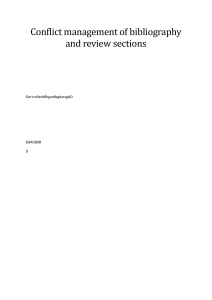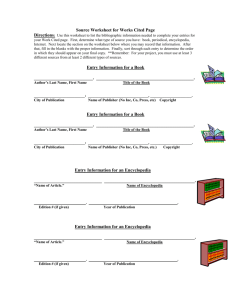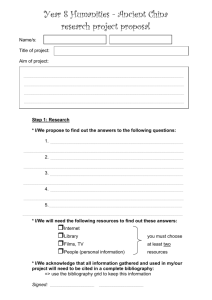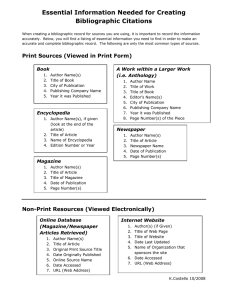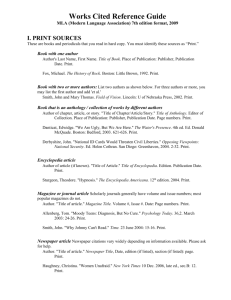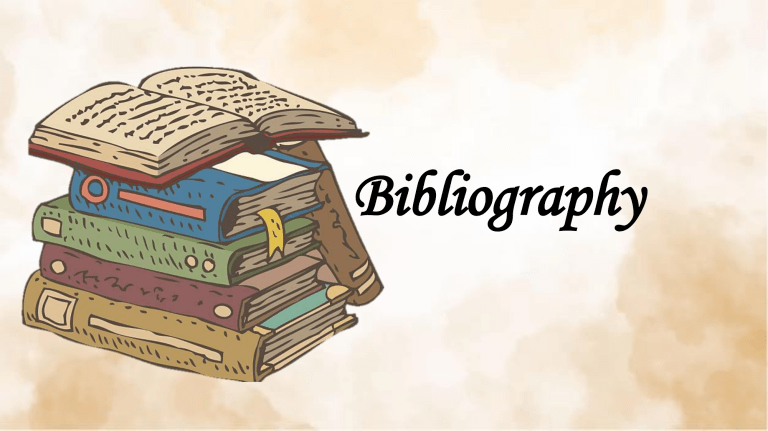
Bibliography A Bibliography is a list of all the different sources that you used for support of your topic. It contains a list of books or articles, or both, relating to a particular subject. In a research paper, a bibliography is an alphabetical list, sometimes grouped into categories, containing the names of all works quoted from or generally used in its preparation. Bibliographical items should be arranged correctly and consistently. When do you use a bibliography? 1. In a report with statistics, examples or case studies to show where you found those facts. 2. In a paper/ report that uses a main idea from the author. 3. In a research paper to show ALL the different sources required by the teacher. 4. In using sources’ exact words (direct quotation) in an article. 5. in sources used in presenting a theory, argument, or point of view in an article. What are some “sources” your teacher might ask you to use? Textbooks/ Newspaper Books Person/s Encyclopedia Interviewed Magazine World wide Article web Journal What does it mean to a source? “cite” If you borrow ideas from a source, you must acknowledge it or give credit to it. Otherwise, you will commit plagiarism. You cite the source by writing it down in the bibliography or sometimes referred to as Works Cited. What are the important points remember in writing a bibliography using the APA format? 1. All names of authors should start with the family name, followed by the first name. The surname is followed with the initials of the first name and middle name. 2. For a source with several authors, the words et al. is used to mean many or several authors. 3. All titles of books, magazines, encyclopedia and newspaper articles should be underlined italicized. or 4. Titles of topics of magazine and newspaper articles as well as materials from the encyclopedia must be enclosed in quotation marks. 5. Correct punctuation marks, such as period, after the author’s name, title of the book, encyclopedia, magazines and newspaper articles should be observed. 6. A comma is placed after the author’s family name to separate it from the first name and to separate it from the name of the publisher 7. For dates of publication, the year- month-day system is used. 8. List should be alphabetized according to author’s surnames. What information do you need when you cite various sources? 1. BOOK 1.1 One Author • Author’s last name, first, initial. (Publication date). Book title. Additional information. City of publication: Publishing company. Example Garcia, M. (1994). The Mango Tree. Manila: Liwanag. 1. BOOK 1.2. Two Authors • Example Dorn, L.J. & Soffos, C. (2005). Teaching for Deep Comprehension. Maine: Stenhouse Publishers. 1.3. Several Authors • Example Lauengco, A., et.al. (1999). English CV for High School (3rd ed.). Makati: Bookmark Inc. 2. ENCYCLOPEDIA Structure: Author’s name. (Year Published). (Article Title). Name of Encyclopedia. Volume, pages. City of Publication: Publishing Company. “Topic Title.” Name of Entire Encyclopedia. Year of Publication. Volume, page(s). Example without author & with author Helms, R. (1995). “Electric Light”. World Book Encyclopedia. “Helium”. (2006). The World Book Encyclopedia. 6, 98-107. 3. Magazine Article Structure: Author’s name. (Year, Month Published). “Article Title”. Periodic Titles. Author if available. “Title of Article”. Periodical Title. Date. Volume number, Page. • Example Cometa, S. (2007, January). “Studying Chinese”. Education Weekly. 8, 12-13. 4. JOURNAL Structure: Author. (Year Published). “Article Title”. Journal Title. Volume, Issue No. Publication date. Journal page numbers. • Example Seals, D.R. (2009).” Habitual exercise and vascular ageing”. The Journal of Physiology.587, 23. 5541-5549. 5.NEWSPAPER Name of the Author. Year, Month, Day Published. “Article Title.” Newspaper Title [City], page numbers. Example Cortez, A. (2005, July 7). “Dealing with Insomnia”. Philippine Star. pp. A2. 6. PERSON INTERVIEWED Name of person interviewed. Type of interview. Date of interview. Example Soriano, A. (2008, April 5). Email interview. 7. WORLD WIDE WEB Author(s). "Title of Specific Page." Title of Website, Publisher, date of publication, url. • Example Mendeley, J.A. (2017, January 16). How and when to reference. Retrieved from https://www.howandwhentoreference.com Activity: Punctuate Me! Directions: One important point to consider in writing correct entries in a bibliography is putting the correct punctuations. Use the correct punctuation marks in the following entries. Write your answer on a separate sheet of paper. Directions A: One important point to consider in writing correct entries in a bibliography is putting the correct punctuations. Use the correct punctuation marks in the following entries. Write your answer on a separate sheet of paper. 1. Silicon 2007 The Encyclopedia Britannica 20 118-132 2. Silicon 2010 March 6 www.science/ university of EUCLA.edu 3. Setterberg J 2004 The Many Uses of Silicon Chicago Braxton Publishers, Inc. 4. Helms R 1995 ed Electric Light World Book Encyclopedia 5. Villanueva A 2020 Feb 28 DENR leads Tayo and Kalikasan Campaign Manila Standard 8 12 Directions B: Alphabetize the following to make a correct bibliography. Write the number (1,2,3) on the blank provided. 1.Gutierrez, A. (2005, June 25). “The Island of Camiguin.” Travel . 20-21. Print. 2. Marquez, S. (2003, June 23). “Visiting Korea.” Philippine Daily Inquirer B2. Print. 3. Eiselen, M. (1999). "Franklin, Benjamin." The World Book Encyclopedia. Directions C. Write the correct citations based on the following sets of information. Write your answer on a separate sheet of paper. 4. Author’s name: Daniel Cohen. Title of the Book: America’s Very Own Ghost. City of Publication: New York: Publisher: Doubleday, Year of Publication: 1985. 5. Writer’s Name: Felix Garcia. Pages: 10 – 11. Title of Article: “Euphoria”. Volume Number: 15, Name of the Magazine: Tribal. Date of Publication: November 20, 2005. Thank You for Listening!
